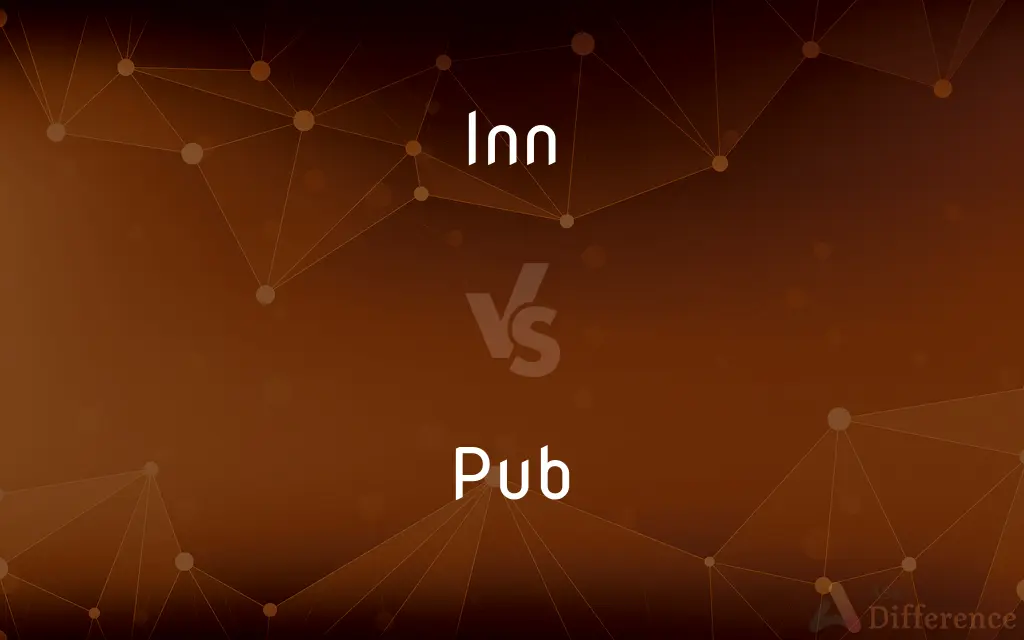Inn vs. Pub — What's the Difference?
By Tayyaba Rehman & Fiza Rafique — Updated on April 5, 2024
An inn offers lodging for travelers with possible food and drink, while a pub primarily serves alcoholic beverages and food without lodging.

Difference Between Inn and Pub
Table of Contents
ADVERTISEMENT
Key Differences
An inn provides a place to stay for guests, often including meals and sometimes a bar, catering to travelers seeking rest and accommodation. Historically, inns served as a resting place for people on long journeys, offering not just a bed for the night but also food, drink, and stabling for horses. In contrast, a pub, short for public house, is a social drinking establishment found mainly in Britain and Ireland, focusing on serving alcoholic beverages, non-alcoholic drinks, and traditional pub food. Pubs are central to the culture of their communities, often acting as a focal point for socializing.
While inns are part of the hospitality industry, providing a range of services including lodging and meals, pubs are part of the food and beverage industry, with a primary emphasis on creating a welcoming environment for drinking and eating. The distinction is significant, as inns offer a more comprehensive range of services to accommodate overnight guests, whereas pubs typically do not offer lodging.
From a historical perspective, inns played a crucial role in the development of travel and commerce, providing essential services for travelers and merchants. Pubs, on the other hand, have historically been gathering places for locals to socialize, discuss news, and engage in community activities, serving as important cultural hubs.
The atmosphere in inns and pubs can also differ; inns often have a quieter, more reserved environment suitable for resting and overnight stays, while pubs are known for their lively, convivial atmosphere, especially on evenings and weekends. This difference underscores the primary functions of each establishment: one as a place of rest and the other as a place of social gathering.
While both inns and pubs can serve food and drink, their core offerings diverge significantly, with inns focusing on lodging and pubs on providing a social drinking experience. The choice between an inn and a pub depends on the needs of the individual—whether they are seeking accommodation or a place to drink and socialize.
ADVERTISEMENT
Comparison Chart
Primary Service
Lodging with optional food and drink.
Alcoholic beverages and food without lodging.
Origin
Middle Ages, serving travelers.
Ancient history, as a communal drinking house.
Cultural Role
Facilitate travel and commerce.
Social hub for locals and community gatherings.
Location
Often found in countryside or along highways.
Typically located in urban or village centers.
Atmosphere
Quiet, restful environment for guests.
Lively, social atmosphere for drinking and eating.
Compare with Definitions
Inn
A place offering overnight accommodation for travelers.
We stayed at a charming inn in the countryside.
Pub
A place serving alcoholic drinks and food in a casual setting.
Let's meet at the pub tonight for a drink.
Inn
Often includes meals and possibly a bar.
The inn provided a hearty breakfast before our departure.
Pub
Can be the cultural heart of a community.
The village pub is where everyone gathers to catch up.
Inn
Suitable for longer stays with amenities.
The inn had both a restaurant and a small library for guests.
Pub
Acts as a social gathering spot.
The local pub hosts a quiz night every Wednesday.
Inn
Can be found along highways or in rural areas.
The roadside inn was a welcome sight after a long day of driving.
Pub
Offers a variety of beers, ales, and pub food.
The pub is known for its wide selection of local ales.
Inn
Historically significant in facilitating travel.
The ancient inn has been serving travelers since the 1600s.
Pub
Often features a convivial and lively atmosphere.
The pub was bustling with laughter and conversation.
Inn
To house; to lodge.
When he had brought them into his cityAnd inned them, everich at his degree.
Pub
A pub (short for public house) is an establishment licensed to serve alcoholic drinks for consumption on the premises. The term public house first appeared in the late 17th century, and was used to differentiate private houses from those which were, quite literally, open to the public as 'alehouses', 'taverns' and 'inns'.
Inn
Inns are generally establishments or buildings where travelers can seek lodging, and usually, food and drink. Inns are typically located in the country or along a highway; before the advent of motorized transportation they also provided accommodation for horses.
Pub
A place of business serving beer or other alcoholic drinks and often basic meals.
Inn
A public lodging house serving food and drink to travelers; a hotel.
Pub
A public house where beverages, primarily alcoholic, may be bought and consumed, also providing food and sometimes entertainment such as live music or television.
Inn
A tavern or restaurant.
Pub
A public server.
Inn
Chiefly British Formerly, a residence hall for students, especially law students, in London.
Pub
Clipping of publication
Registered pubs
Inn
Any establishment where travellers can procure lodging, food, and drink.
Pub
To go to one or more public houses.
Inn
A tavern.
Pub
To publish
Inn
One of the colleges (societies or buildings) in London, for students of the law barristers.
The Inns of Court
The Inns of Chancery
Serjeants’ Inns
Pub
Tavern consisting of a building with a bar and public rooms; often provides light meals
Inn
The town residence of a nobleman or distinguished person.
Leicester Inn
Inn
(obsolete) A place of shelter; hence, dwelling; habitation; residence; abode.
Inn
To house; to lodge.
Inn
To take lodging; to lodge.
Inn
A place of shelter; hence, dwelling; habitation; residence; abode.
Therefore with me ye may take up your innFor this same night.
Inn
A house for the lodging and entertainment of travelers or wayfarers; a tavern; a public house; a hotel.
The miserable fare and miserable lodgment of a provincial inn.
Inn
The town residence of a nobleman or distinguished person; as, Leicester Inn.
Inn
One of the colleges (societies or buildings) in London, for students of the law barristers; as, the Inns of Court; the Inns of Chancery; Serjeants' Inns.
Inn
To take lodging; to lodge.
Inn
A hotel providing overnight lodging for travelers
Common Curiosities
What is a pub?
A pub is a drinking establishment that offers alcoholic beverages and often food, but no lodging.
Are pubs exclusive to Britain and Ireland?
While pubs are a significant part of British and Irish culture, pub-like establishments exist worldwide under various names.
What is an inn?
An inn provides lodging and often food and drink for travelers.
Do all inns serve food?
Most inns offer food, but the range and availability can vary.
Is there a historical difference between inns and pubs?
Yes, inns historically provided lodging for travelers, while pubs served as local drinking establishments.
How does an inn differ from a hotel?
Inns are generally smaller, with a more personal touch, whereas hotels may offer more amenities and standardized services.
Can inns be found in cities?
Yes, though they are more commonly located in countryside or scenic areas.
Can you stay overnight at a pub?
Typically, no. Pubs usually do not offer lodging services.
How old is the tradition of inns and pubs?
Both have ancient origins, with pubs dating back to Roman taverns and inns to medieval times.
Can a pub also be an inn?
Some establishments function as both, offering food, drink, and lodging, though they might be more commonly referred to as inns.
What is pub food like?
Pub food is often casual and hearty, designed to complement the drinking experience.
What kind of food is served in a pub?
Pubs typically serve hearty, traditional dishes along with snacks.
Why are pubs important to local communities?
Pubs serve as social centers where locals meet, socialize, and hold events.
Do inns and pubs need different licenses?
Yes, the specific licenses required can vary, especially regarding lodging and alcohol service.
Are inns considered luxury accommodations?
Inns vary widely, from simple budget-friendly lodgings to high-end, luxury accommodations.
Share Your Discovery

Previous Comparison
Barley vs. Grain
Next Comparison
Content vs. QuantityAuthor Spotlight
Written by
Tayyaba RehmanTayyaba Rehman is a distinguished writer, currently serving as a primary contributor to askdifference.com. As a researcher in semantics and etymology, Tayyaba's passion for the complexity of languages and their distinctions has found a perfect home on the platform. Tayyaba delves into the intricacies of language, distinguishing between commonly confused words and phrases, thereby providing clarity for readers worldwide.
Co-written by
Fiza RafiqueFiza Rafique is a skilled content writer at AskDifference.com, where she meticulously refines and enhances written pieces. Drawing from her vast editorial expertise, Fiza ensures clarity, accuracy, and precision in every article. Passionate about language, she continually seeks to elevate the quality of content for readers worldwide.














































